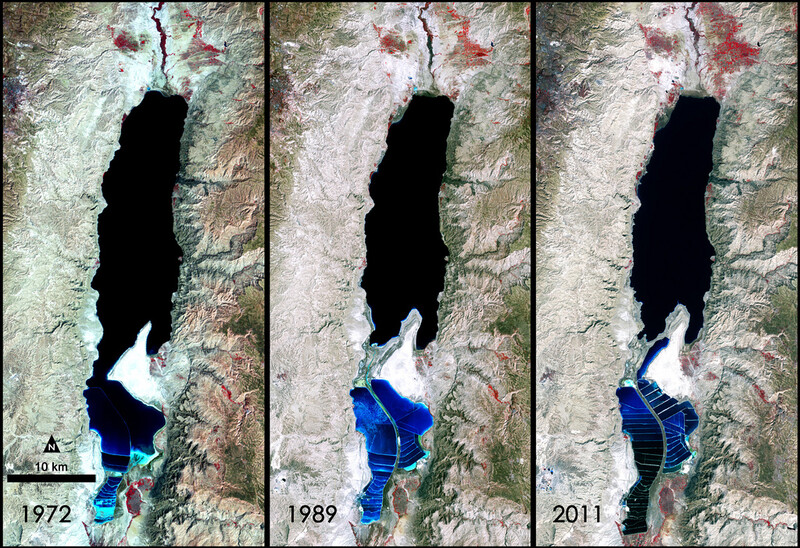Rights and Accountability 21 October 2013

Images taken from space show the shrinkage of the Dea Sea from 1972 to 2011. (NASA)
Water experts and Palestinian environmental and agricultural groups are urging Palestinian Authority and Palestine Liberation Organization leaders to halt cooperation with a World Bank project to pump water 200 kilometers from the Red Sea to the Dead Sea.
The Palestinian groups and water experts say the plan, officially known as the Red Sea-Dead Sea Conveyance Project (RSDSCP), will do irreversible environmental damage and help Israel further dispossess Palestinians of their water rights.
Saving the Dead Sea?
The Dead Sea is a unique salt lake that lies in a deep trough more than 300 meters below sea level. It is fed by the Jordan River and is bordered by Jordan, the occupied West Bank and present-day Israel.
The Dead Sea has been shrinking rapidly due to Israel’s diversion of the head waters of the Jordan River.
As a result of this diversion, the Jordan River, in which Christian tradition holds that Jesus was baptized, has been reduced to a stream made up only of “sewage and effluent from fishponds,” according to Tel Aviv University environmental sciences professor Marcelo Sternberg.
Supporters of the World Bank project, including Israel and Jordan, say the plan will replenish the Dead Sea using ocean water.
Project proponents also say the plan will provide hydro-electric power to run desalination plants to provide fresh water to the parched region.
While the project has been planned for years, no final agreement has been reached among the concerned governments to begin work.
In August, Jordan announced it was unilaterally proceeding with an early phase of the plan.
Irreversible damage and dispossession
“It has become clear beyond doubt that the project is an unacceptable attempt to force the Palestinian population to consent to their own dispossession and to compromise on their own rights,” the statement from the Palestinian groups says.
“Instead of addressing Israel’s water theft” from the Jordan River, “the project aims to maintain the unjust status quo of the river and allegedly ‘save’ the Dead Sea through large scale Red Sea water transfer,” the groups add.
Among more than twenty bodies endorsing the statement are the Palestinian Environment NGO Network, Stop the Wall, Palestine Hydrology Group, Palestinian Agricultural Relief Committees, Union of Agricultural Work Committees, the Institute of Environmental and Water Studies at Birzeit University and the Palestinian Centre for Human Rights.
World Bank ignores concerns
If implemented, the plan will “actually destroy the unique features of the Dead Sea and its ecosystem” reducing it to “a dead, engineered pool of Red Sea water,” destroying this Palestinian and world heritage site.
According to the statement, the World Bank feasibility studies have consistently ignored Palestinian concerns and breached its own ethical guidelines. “[T]he entire conduct of the World Bank lack[s] credibility and transparency,” the groups say. “Throughout the process, the Bank has systematically turned a blind eye to Israeli violations of Palestinian water rights.”
The World Bank has a long and notorious history of financing environmentally-destructive mega-projects, particularly big dams.
False promises of fresh water
Palestinians living under Israeli occupation suffer catastrophic shortages of water, while Israeli settlers have plentiful supplies, often enjoying lush lawns and swimming pools.
Under what some have termed “water apartheid,” Israeli settlers use on average six times more water than Palestinians.
But the Dead Sea project’s promises of plentiful fresh water are also false, according to the statement, and the little that may result would only provide a cover for Israel’s ongoing theft and over-exploitation:
the project attempts to replace the river’s natural fresh water appropriated by Israel from the upper Jordan River with desalinated Red Sea water sold at high costs to severely water-dispossessed Palestinians and at pitiful quantities. Even these sales remain merely an “option” and the World Bank studies plan to ‘supply’ only Jericho, which is currently the only water-rich place in the occupied West Bank. With every drop of water that Palestinians purchase, they capitulate to their own deprivation.
Instead of this expensive and destructive project, the statement calls for Israel to “be held accountable for the damage” it is causing to vital Palestinian water sources, especially the West Bank’s Eastern Aquifer which supplies one million Palestinians.




